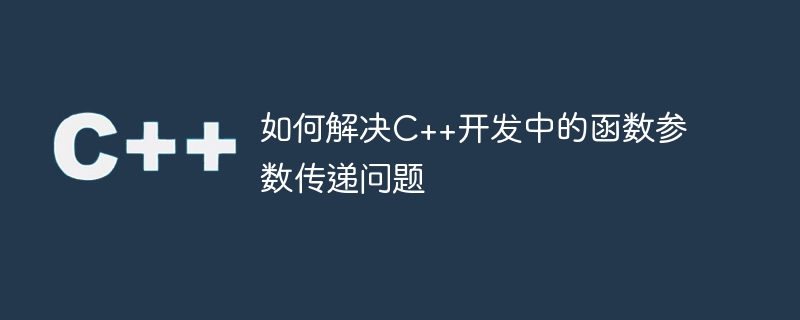Home >Backend Development >C++ >How to solve the function parameter passing problem in C++ development
How to solve the function parameter passing problem in C++ development
- WBOYWBOYWBOYWBOYWBOYWBOYWBOYWBOYWBOYWBOYWBOYWBOYWBOriginal
- 2023-08-22 16:11:051093browse

How to solve the function parameter passing problem in C development
With the development of the fields of computer science and software development, C has become a very popular programming language. In the C development process, function parameter passing is a common problem because it directly affects the performance and efficiency of the program. This article will introduce some common problems and solutions to help developers better handle function parameter passing issues.
1. Value passing
Value passing is the most common parameter passing method in C. This means that the value of the parameter is copied to the parameter of the function, and changes made by the developer inside the function will not affect the original parameter value. This method is simple and straightforward and suitable for most situations. However, if the parameters are too large, additional overhead will be incurred, especially in the case of recursive calls and large-scale data processing. For large data structures, consider using pass by reference or pointer to avoid unnecessary copies.
2. Passing by reference
Passing by reference is another common parameter passing method. By using the reference symbol (&), you can directly access the original parameters passed to the function. This avoids the overhead of copying large data structures, and modifications to parameters are directly reflected in the original parameters. Passing by reference is useful when working with large data structures or when parameter values need to be modified. However, it should be noted that modifying the value of a reference parameter within a function may have unexpected effects on the caller of the function. Therefore, when using pass-by-reference, you should be careful when modifying the value of a parameter, or use a const reference to avoid accidental modification.
3. Pointer passing
Pointer passing is the most flexible parameter passing method in C. By declaring the parameters as pointer types, the original parameters passed to the function can be directly accessed and their values can be modified. Pointer passing is suitable for situations where parameter values need to be modified, or memory needs to be dynamically allocated within a function. However, there are also some problems with pointer passing, such as the safety of null pointers and pointer operations. Therefore, when using pointer passing, be sure to pay attention to safety and error handling.
4. Constant passing
Constant passing is a special parameter passing method. It can only be used to pass constant values or unmodifiable parameters. By using constant passing, you can ensure that the function does not modify the parameters passed to it, thus improving the maintainability and safety of the program. Constant passing can be implemented using pass by value, pass by reference, or pass by pointer, depending on the type of parameters and requirements.
It should be noted that when handling function parameter transfer, the appropriate transfer method should be selected according to the specific situation. In general, passing by value is the simplest and safest option. However, for large data structures, when parameter values need to be modified, or when memory is dynamically allocated, pass by reference or pass by pointer is a better choice. In addition, when dealing with pointer transfer, be sure to pay attention to the validity and error handling of pointers to avoid errors during program runtime.
To sum up, function parameter passing is a common and important problem in C development. Reasonable selection of delivery methods can improve the performance, efficiency and maintainability of the program. This article introduces common transfer methods, including value transfer, reference transfer, pointer transfer and constant transfer, and provides corresponding solutions and precautions. It is hoped that with this knowledge, developers can better handle the problem of function parameter passing and improve their programming capabilities and the quality of their projects.
The above is the detailed content of How to solve the function parameter passing problem in C++ development. For more information, please follow other related articles on the PHP Chinese website!

